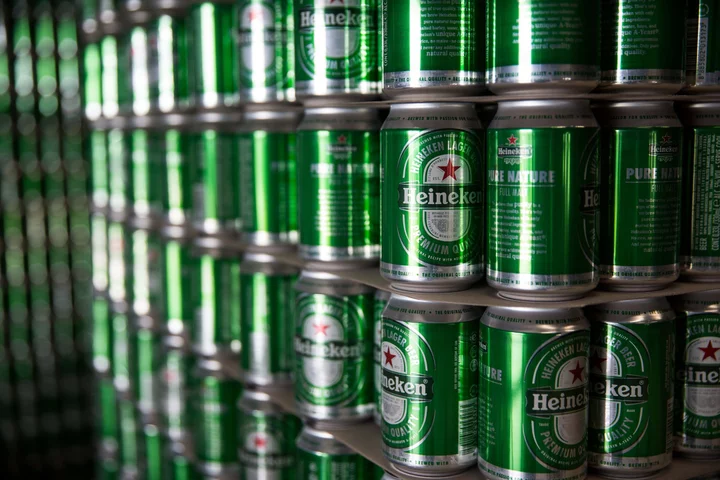It’s been a sobering earnings season for Europe’s corporations, unless you’re a bank.
While a higher portion has exceeded consensus on the EPS level than companies that missed, results in the energy and basic materials sectors have mostly disappointed, according to Bloomberg Intelligence, with healthcare and consumer discretionary earnings also less than stellar. The current reporting cycle marks the weakest since the first quarter of 2020, strategists at HSBC say.
Still, investors are giving brewers Heineken NV and Anheuser-Busch InBev SA the benefit of the doubt ahead of results next week even after earnings from Italian drinks company Davide Campari SpA fell short of estimates on Wednesday. Thirsty weather should spell more sales for the beermakers, although customers’ penchant for premium ales will be the measure of how much in an increasingly sluggish economy.
Dutch coffee seller JDE Peet’s NV, reporting mid-week, is also under pressure to stabilize sales volumes as fragile consumer confidence strains demand. Meanwhile, German industrials are reeling from a slew of profit warnings and a faltering Chinese economy, although carmaker BMW could buck that trend next week as it benefits from demand for higher-margin models. Danish shipper A.P. Moller-Maersk A/S is also due.
Highlights to look for next week:
Monday: Heineken’s (HEIA NA) half-year report at 7 a.m. CEST will reveal whether price increases were enough to offset costs for the Dutch beer giant. Full-year guidance depends on its ability to limit volume declines of its premium brews, BI’s Duncan Fox said. Maintaining growth for the premium ales will “aid pricing,” which probably still grew at a low-teens percentage rate in the first six months, he said.
Tuesday: Disappointing results from Shell Plc on Thursday set the stage for competitor BP Plc (BP/ LN), whose report will wrap up a tough quarter for Big Oil firms from Exxon Mobil Corp. to TotalEnergies SE that have seen lower margins for petrochemicals weigh on profits. As important as the earnings will be, investors may focus more on its third-quarter buyback projection, which could turn out to be a more modest $1 billion to $1.5 billion amid declining surplus free cash flow, according to BI’s Will Hares. That compares against the $1.75 billion it announced with first-quarter results. BP may report a “material easing” in sequential adjusted earnings due to a softening of oil and gas benchmarks and refining margins as seasonal maintenance reduces upstream production volumes, Hares predicts.
Wednesday: JDE Peet’s (JDEP NA) could achieve its organic sales target of 3% to 5% by pricing alone in the first half, as last year’s increases flow through, according to BI. But fragile consumer confidence and fixed food budgets could suppress demand in key markets as coffee prices remain elevated. Future price hikes will be difficult to achieve, putting pressure on the company to stabilize volumes. EPS is expected to decline 24%, while the gross margin may drop 75bps to 36.8% in the first half. The company is hoping a bigger crop from Brazil will lead to lower prices, aided by its plan to acquire the Brazilian coffee and tea business from JAV Group.
Thursday: BMW’s (BMW GY) results at 7:30 a.m. CEST should reveal another strong Ebit margin at the key automotive division boosted by a jump in higher-margin China sales, although it may refrain from lifting guidance of 8% to 10% for the year given the uncertainty on pricing and order levels for the remainder of the year, BI’s Michael Dean said. Estimates compiled by Bloomberg point to the upper end of that range for the second quarter and the year as a whole.
Read More: VW Sales Forecast Cut Puts Carmaker Out of Step With Peers
- Belgian brewer AB Inbev (ABI BB), stung by the backlash from US political conservatives over its collaboration with a transgender influencer to promote its Bud Light brand, is trying to steer the conversation back to beer with a summer advertising campaign. Profitability in the US is at risk of evaporating if volumes don’t stabilize, according to BI, which estimates InBev has lost more than 6% dollar-market share in the fallout. The company will need additional marketing spending, but that would hamper results later in the year, BI said. One shareholder still confident in its investment is Colombia’s Santo Domingo family, which cut its stake in JDE Peet’s this year without touching its major asset InBev, filings showed.
Friday: Denmark’s Maersk (MAERSKB DC), scheduled to report before market open, is seen posting a 78% drop in second-quarter Ebitda to $2.26 billion, as freight rates have plunged to pre-pandemic levels after the highs of 2021 and 2022. Maersk, which transports close to one-fifth of the world’s containers, has already cautioned that the first three months “will be the best quarter of the financial year,” with CEO Vincent Clerc noting that there are “still a lot of clouds that we need to handle.” Despite the company’s pivot toward being an integrated logistics company, it retains heavy exposure to the traditional supply and demand fundamentals of the shipping industry, Jefferies analyst Omar Nokta said. Recovery in carried volumes during the year and moderation in operating costs are among the catalysts going forward, he added.
- To subscribe to earnings coverage across your portfolio or other earnings analysis, run NSUB EARNINGS.
- Follow our Top Live blogs for real-time coverage and analysis of the biggest results.
- For more on what’s going on in other regions, see the US Earnings Week Ahead or the Asia Earnings Week Ahead, and see the ESG Stock Watch for a selection of the environmental, social and governance themes that may come up on the week’s earnings calls.
--With assistance from James Cone, Michael Msika, Tuhin Kar, Laura Malsch, Christopher Jungstedt and Maggie Shiltagh.

